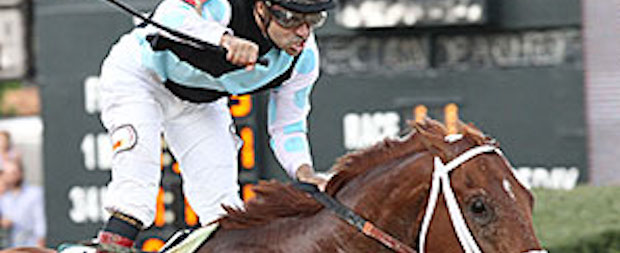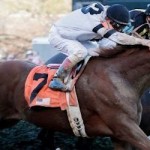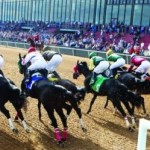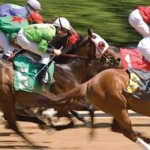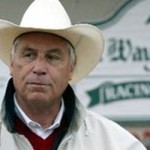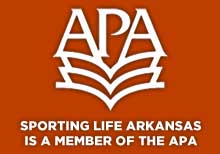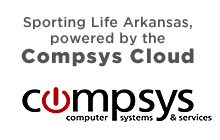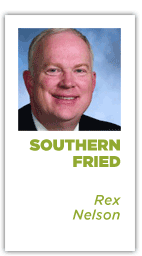 With so much of the post-Belmont Stakes media focus on the comments made by that classless buffoon Steve Coburn, an important fact may have been lost on thoroughbred racing fans in Arkansas: Horses that ran at Oaklawn Park in Hot Springs earlier this year are having very good campaigns.
With so much of the post-Belmont Stakes media focus on the comments made by that classless buffoon Steve Coburn, an important fact may have been lost on thoroughbred racing fans in Arkansas: Horses that ran at Oaklawn Park in Hot Springs earlier this year are having very good campaigns.
At least the weekend outbursts of California Chrome’s co-owner allowed the always snarky headline writers at The New York Post to come up with a classic: Triple Clown.
Meanwhile, try this on for size as far as thoroughbreds you may have seen run at Oaklawn earlier this year:
- Commissioner, who finished sixth in the Arkansas Derby on April 12, almost stole the Belmont Stakes, finishing second last Saturday out on Long Island.
- Bayern, who finished third after going off as the favorite in the Arkansas Derby, won the Grade II Woody Stephens Stakes at Belmont Park on Saturday.
- Danza, the surprise winner of the Arkansas Derby, went on to finish third in the Kentucky Derby on May 3.
- Ride On Curlin, the place horse in the Arkansas Derby, finished second in the Preakness Stakes on May 17.
- Close Hatches, which won Oaklawn’s Grade II Azeri and Grade I Apple Blossom this year, came back at Belmont Park last Saturday to capture the $1 million Ogden Phipps Stakes for older fillies and mares.
This is all good news for Oaklawn, whose national profile has grown steadily for a decade now as the number of tracks nationwide has shrunk.
A decade ago, Oaklawn owner Charles Cella announced a $5 million bonus for any 3-year-old who won the Rebel Stakes, the Arkansas Derby and the Kentucky Derby. Smarty Jones pulled it off, of course, winning a total of $5.8 million on the first Saturday of May 2004. It was the most money ever paid to a horse for winning a race. At Oaklawn that day, more than 7,000 people showed up just to watch the Kentucky Derby simulcast. Smarty Jones captured the hearts of Americans in all 50 states as he went on to win the Preakness Stakes. He went off as the favorite in the Belmont Stakes before being run down in the final furlong by Birdstone.
Oaklawn has been in the racing spotlight ever since.
In 2005, Arkansas Derby winner Afleet Alex won both the Preakness and the Belmont Stakes, meaning that the previous two Arkansas Derby winners had captured four of the six Triple Crown races in 2004-05.
In 2007, Curlin won the Arkansas Derby, finished third in the Kentucky Derby, won the Preakness Stakes and finished second in the Belmont Stakes. Curlin would go on to win the Jockey Club Gold Cup at Belmont Park and the Breeders’ Cup Classic at Monmouth Park en route to being named the Eclipse Award Horse of the Year.
Since that run of success, purses have increased dramatically at Oaklawn due to the popularity of the adjacent gaming operations. In the spring of 2005, as Afleet Alex was giving Oaklawn positive publicity with his exploits on the track, something even more important was happening in Little Rock. The Arkansas Legislature passed a law allowing local elections to add electronic gaming at Oaklawn in Hot Springs and at Southland Park in West Memphis. Both local initiatives were approved.
In September 2007, the Arkansas Supreme Court upheld the law, declaring that there “was noting irrational or arbitrary about the Legislature’s decision to authorize wagering on electronic games of skill at the state’s establishments, which were already engaged in pari-mutuel wagering, which were subject to a competitive disadvantage by their counterparts in others states and most importantly which are considered to be vital to the state and local economies.”
In 2000, Oaklawn had developed Instant Racing machines in partnership with AmTote. The machines allowed visitors to bet on previously run races. The 2005 legislative act opened the door for electronic poker, blackjack, craps and other games. In November 2005, Hot Springs voters approved the so-called games of skill by a margin of just 89 votes out of almost 9,400 votes cast.
Oaklawn opened its gaming center in May 2009. The center covered 53,000 square feet on the south end of the track with positions for 650 players. Construction began right after the Arkansas Derby was run in April 2008. Within months of the opening of the gaming center, Oaklawn officials announced they would expand it to 90,000 square feet with player positions for more than 1,000 people and a buffet.
Now, Oaklawn is spending another $20 million on a 58,000-square-foot expansion that’s expected to be completed by the end of this year while creating 200 jobs.
“The demand is there for a larger facility,” says Eric Jackson, the Oaklawn general manager.
What does this mean for those who prefer thoroughbreds over electronic games? It means bigger purses and bigger fields in each race. With each passing year, Oaklawn moves higher in the national pecking order as racing falters in other areas of the country.
“These are Oaklawn Park’s glory days,” Mary Rampellini wrote in the Daily Racing Form at the start of the 2014 live meet at Oaklawn. “From Smarty Jones in 2004 to Oxbow last May, the Oaklawn meet has spawned eight recent Triple Crown race winners. And because of horses like Afleet Alex, Curlin, Summer Bird, Rachel Alexandra, Lookin At Lucky and Super Saver, this is arguably the track’s most significant era.”
Jackson told Rampellini: “Oaklawn has been doing this 110 years. These are the best years right now. It has been a remarkable 10 to 12-year run, and the future looks bright.”
A track that can house 1,540 horses had requests for more than 2,800 stalls going into the year.
Compare that with what’s going on in south Florida, where it had appeared that Calder Race Course might close. Late last month, it was announced by Churchill Downs Inc. that Frank Stronach’s The Stronach Group would take over racing at the track while CDI would continue to operate the adjoining casino. The Stronach Group said it would run only the minimum number of 40 race days at Calder – probably in the fall – that are required by Florida law. Stronach already owns nearby Gulfstream Park, which will run far more races than Calder each year.
“Without this arrangement, there’s no apparent, viable long-term solution to preserving racing in south Florida on a year-round basis,” said William Carstanjen, the CDI president.
Also compare what’s happening at Oaklawn with what’s happening in southern California, where Hollywood Park closed for good on Dec. 22. That ended 75 years of racing that saw thoroughbreds such as Affirmed, Seattle Slew, Citation and Seabiscuit run there. The first Breeders’ Cup in 1984 was held at Hollywood Park, which is now being turned into a retail and residential devleopment. The bugler played “Auld Lang Syne” for the final post parade and then the horses walked onto the track as the Etta James classic “At Last” blared throughout the facility.
Hollywood Park had opened in 1938 with movie moguls such as Harry and Jack Warner involved. Elizabeth Taylor, Bing Crosby and Jimmy Stewart were regular patrons through the years.
“The thing I remember most was getting up close to the winner’s circle and seeing Cary Grant,” trainer Bob Baffert said. “That was a thrill.”
Hall of Fame trainer Jack Van Berg told a reporter that day: “It’s ridiculous to let something like this that so many people love and thrive on close. They did everything they could to kill racing. I’ve had enough. I don’t like California racing anymore. I don’t like the way they run it and what they do.”
In 2008, Bay Meadows near San Francisco had closed.
So where would the 77-year-old Van Berg take his stable, the reporter wanted to know.
“Arkansas,” he answered.
So it goes in this modern era when racing in most states suffers while the thoroughbred game in Arkansas thrives.
In an interview published Sunday in The New York Times, Steve Wolfson, the son of Affirmed owner Louis Wolfson, was asked about the future of the racing industry.
“I think it’s bleak,” he answered. “We have not done a good job of introducing people to the sport so they can understand it. A lot of tracks don’t treat you well. I just think it has been marketed terribly.”
Then there’s Arkansas, where whole families go to the races, the media pays attention to the sport and a spring Saturday when the Oaklawn infield is open is like a giant party.
Finally, compare Wolfson’s down-in-the-dumps attitude with the comments of Oaklawn’s Jackson, who says the current expansion “marks a turning point for Oaklawn as well as the racing and gaming industry in Arkansas. This will allow us to continue to grow our racing programs. And it reflects our continued commitment to a high level of service and our commitment to keeping Oaklawn the No. 1 tourist destination in Arkansas. We will continue to build our business by offering our guests a fun, friendly, safe, clean and convenient experience.”
Even Steve Coburn would have a hard time arguing with that.


